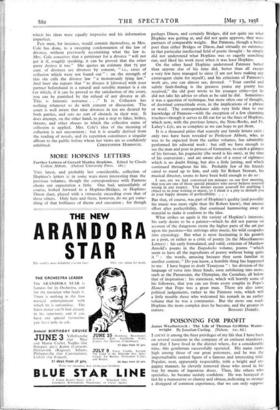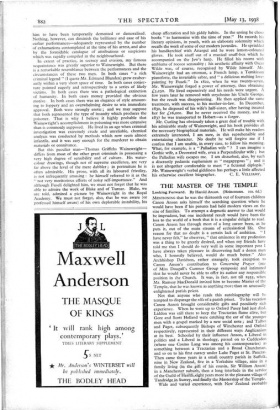POISONING FOR PROFIT
I COUNT it among the finer privileges of my life that I have been on several occasions in the company of an eminent murderer, and that I have lived in the district where, for a considerable time, this gentleman successfully operated. His name ranks high among those of our great poisoners, and he was the imperturbable central figure of a famous and interesting trial. Popular, neat, apparently respectable, with a bright and en- gaging manner, he cleverly removed those who stood in his way by means of ingenious doses. Then, like others who specialise, he became unduly confident. He was betrayed at last by a manoeuvre so clumsy and obtuse, indicating so strange a disregard of common experience, that we can only suppose
him to have been temporarily demented or demoralised. Nothing, however, can diminish the brilliance and ease of his earlier performances—adequately represented by the number of exhumations contemplated at the time of his arrest, and also by the formidable catalogue of attributions or suspicions which was rapidly compiled in the neighbourhood.
In extent of practice, in secrecy and evasion, my famous acquaintance was greatly superior to Wainewright. But there is a remarkable resemblance between the performances and the circumstances of these two men. In both cases " a rich criminal legend " (I quote Mr. Edmund Blunden) grew exuber- antly within a very short space of time. In both cases conjec- ture pointed eagerly and retrospectively to a series of likely victims. In both cases there was a pathological extinction of humanity. In both cases money provided the obvious motive. In both cases there was an elegance of style amount- ing to foppery and an overwhelming desire to win immediate approval. Both were strongly erotic ; and we may suppose that both represented the type of insanity which produces the poisoner. That is why I believe it highly probable that Wainewright's accomplishment in poisoning was more extensive than is commonly supposed. He lived in an age when criminal investigation was extremely crude and unreliable, chemical analysis was conducted by methods which now seem almost infantile, and it was easy enough for the murderer to obtain materials or connivance.
But this peculiar man—Thomas Griffiths Wainewright- differs from most of the other great criminals in possessing a very high degree of sensibility and of culture. His water- colour drawings, though not of supreme excellence, are very far above the level of the mere dabbler ; in portraiture he is often admirable. His prose, with all its laboured frivolity, is not infrequently amusing : he himself referred to it as the " not very meritorious efforts of noisy self-importance." And although Fuseli delighted him, we must not forget that he was able to admire the work of Blake and of Turner. Blake, we are told, admired a picture by Wainewright in the Royal Academy. We must not forget, also, that he was aware (or professed himself aware) of his own deplorable instability, his cheap affectation and his giddy habits. In the spring he chose books " to harmonise with the time of year." He records his literary opinions, in youth, with an elaborate solemnity which recalls the work of some of our modern juveniles. He sprinkled his handkerchief with Attargul and he wore lemon-coloured gloves. He took snuff out of a musical snuff-box which he accompanied on the Jew's harp. He filled his rooms with emblems of rococo sensuality ; his aesthetic affinity with Oscar Wilde was, of course, recognised by Wilde himself. Mr. Wainewright had an ottoman, a French lamp, a Tomkisson pianoforte, the invariable sabre, and " a delicious melting love- painting by Fuseli." In 1822, when he was twenty-seven, Mr. Wainewright forged a power of attorney, thus obtaining £5,250. He lived expensively and his needs were urgent. A few years later he removed with strychnine his Uncle George, but the result was disappointing. He then applied the same treatment, with success, to his mother-in-law. In December, r83o, he disposed of his wife's half-sister, after having insured her for L16,000. But he never received the money, and in 1837 he was transported to Hobart—as a forger.
Mr. Curling has obviously taken a great deal of trouble with his admirable study of Wainewright, and his book provides all the necessary biographical materials. He will make his readers extremely interested, I am sure, in this reprehensible and entertaining character. No doubt he will forgive me if I confess that I am unable, in every case, to follow his meaning. What, for example, is a " Palladian wife " ? I can imagine a Gothic wife, a Decorated wife, even a Perpendicular wife ; but the Palladian wife escapes me. I am disturbed, also, by such a discreetly pedantic euphemism as " megapygous " ; and it is not altogether comfortable to meet " a fictional diplopia." Mr. Wainewright's verbal giddiness has perhaps a little affected his otherwise excellent biographer. C. E. VULLIAMY.















































 Previous page
Previous page